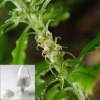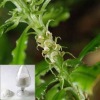- Other Inorganic Salts[4]
- Halide ( Except Chloride )[9]
- Chemical Auxiliary Agent[8]
- Water Treatment[3]
- Other Chemicals[10]
- Other Inorganic Chemicals[2]
- Carbonate[4]
- Sulphate[7]
- Paint & Coating[2]
- Toilet Seat Cover[7]
- Toilet Seats[4]
- Plant Extract[10]
- Agrochemicals & Pesticides[10]
- Organic Acid[9]
- Chemical Reagents[2]
- Nitrate[1]
- Chloride[1]
- Organic Salt[2]
- Healthcare Supplement[3]
- Organic Intermediate[8]
- Food Additives[10]
- Swelling[1]
- Borate[10]
- Phosphate[1]
- Alkali[4]
- Soap[1]
- Other Pharmaceutical Machinery[1]
- Pumps[9]
- Contact Person : Ms. Lei Caiying
- Company Name : Hebei Domydo Co., Ltd.
- Tel : 86-311-85290082--92
- Fax : 86-311-85290095
- Address : Hebei,Shijiazhuang,16A05, Guoda, NO.173 Shuiyuan ST.
- Country/Region : China
- Zip : 050051
Chlorogenic acid
Product Name : Chlorogenic acid,Eucommia extract
Class : Plant extract
Specification : 5%,10%,20%,30%,40%,50%,60%,95%,98%,99%
Test Method : HPLC
CAS# : 327-97-9
Molecular formula: C16H18O9
Molecular weight: 354.30
Latin Name: Bark and leaves of Eucommia ulmoides Oliv.
Appearance: Light yellow to offwhite fine powder
Botanical Source: The leaf of Eucommia Ulmoides Oliver; Honeysuckle Flower
Molecular formula: C16H18O9 Molecular weight: 354.30
What is Chlorogenic acid: Chlorogenic acid is a phenolic natural product isolated from the leaves and fruits of dicotyledonous plants, including the coffee bean, . Structurally, chlorogenic acid is the ester of caffeic acid with the 3-hydroxyl group of quinic acid. a) Has a wide range of biological effects, from insect resistance to human healthb) An important factor in plant metabolismc) An antioxidant and has anti-fungi effectivity, stronger than the antibacterial Function: a) Can be used as anti-infectious active ingredientb) Has wide anti-virus, anti-bacteria effectsc) Has relatively lower toxicity and side-effectsd) Has obvious anti-infectious effects.e) Due to its obvious anti-infectious effects, it not only can be used in pharmaceutical field but also can be used widely in many other fields like food, feed additives and cosmeticsEffectivityd) An ester of caffeic acid and quinic acid, a major phenolic compound in coffee, the daily intake of coffee drinkers is 0.05-0.1ge) Strong antioxidants in vitro and could therefore be contribute to the prevention of disease caused by free radicalsChlorogenic acid, an ester of caffeic acid and quinic acid, is a major phenolic compound in coffee, but is also found widespread in plants and can be isolated from the leaves and fruit . This compound, long known as an antioxidant, also slows the release of glucose into the bloodstream after a meal.
Chlorogenic acid










